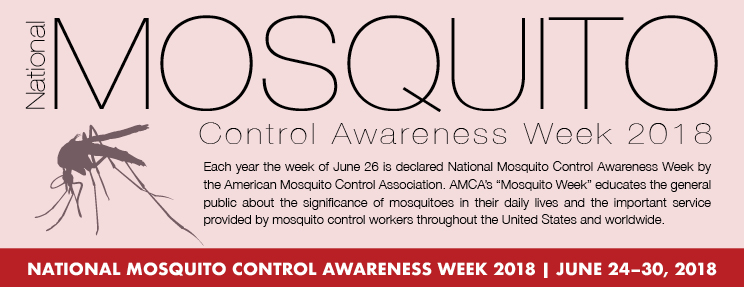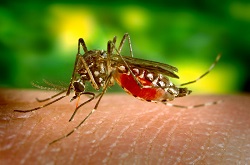By Elisabeth Martinez, Intern, and Chelsea Gridley-Smith, Senior Program Analyst, NACCHO
With the arrival of summer and Fourth of July festivities just around the corner, many people are spending more time outside. The rising temperatures invite a host of disease vectors, including mosquitoes, so proper protection is key. You can play an important role in preventing mosquito bites and eliminating mosquito breeding grounds. National Mosquito Control Awareness Week (June 24-30) serves to remind the public how to protect themselves from mosquitoes and the diseases they can carry.

The goal of National Mosquito Control Awareness Week is to educate the public about the significance of mosquitoes in people’s daily lives and control efforts around the world. The American Mosquito Control Association (AMCA) and the Environmental Protection Agency (EPA) provide strategies protecting yourself from bites, preventing mosquito breeding grounds, and maintaining the mosquito population at a reasonable level.
The Importance of Mosquito Control
Mosquitoes are more than a nuisance; they are vectors for disease. That means if they are infected with a disease, they can transmit that disease when they bite another organism, including humans. Mosquitoes affect the pubic in a variety of ways. For example, their bites can cause an allergic reaction through their saliva, resulting in a red, itchy bump. Mosquitoes may also carry diseases such as malaria, Zika, West Nile virus, yellow fever, Chikungunya, and Dengue to name a few. These diseases can cause serious health complications, including encephalitis, meningitis, and microcephaly, and even lead to death. About 200 mosquito species exist in the United States, all of which live in different environments and bite different organisms.
Protection and Prevention
The AMCA suggests that you protect yourself and the community through the three D’s:
- Drain: Standing water is a breeding ground for mosquitoes to lay and hatch their eggs. It is important to eliminate any standing water in places such as gutters, pet dishes, holes in trees, pools, tires, or other areas in the community that might hold standing water.
- Dress: Many species of mosquitoes are more attracted to dark colors than light colors. Avoid wearing dark clothing, and also wear loose-fitting clothing, as it is easy for the mosquitoes to penetrate through fabric. Long sleeves and pants provide the most protection.
- Defend: Apply registered mosquito repellent according to the directions on the label. The repellents registered by the EPA are proven safe and effective, even for pregnant and breastfeeding women. To find an insect repellent that is right for you, use EPA’s search tool. Keep an eye out for a similar graphic on the container of the repellent that denotes what insect it repels and the length of time the product is effective.

Structural barriers also prevent mosquito breeding and bites. Covering gaps in walls, doors, and windows can keep mosquitoes from entering a home. It is important to also make sure window and door screens are working properly and do not leave any openings or gaps.
Some mosquitoes only bite in the evenings, but others bite during the day when you also need to consider sun protection. Insect repellents can be used in conjunction with sunscreen without reducing their effectiveness. The best strategy is to apply sunscreen first, and then apply the repellent according to label instructions. You may need to apply sunscreen more often and in larger amounts than usually needed to maintain optimal effectiveness. A full ounce (two tablespoons) of sunscreen should be applied to the entire body at least every two hours. It is also best to use separate products for sunscreen and repellent instead of a product that combines the two.
Current Programmatic Efforts
Integrated pest management (IPM) is a science-based, common-sense approach for managing pests and vectors, such as mosquitoes. IPM uses a variety of pest management techniques that focus on pest prevention, reduction, elimination, and infestations. Surveillance keeps a count of the amount and kinds of mosquitoes in a given area, and these results help to determine appropriate responses depending on the severity of the infestation.
The combined efforts of individuals and vector control programs can make this summer more enjoyable and less plagued by mosquito-borne diseases. For more information, visit NACCHO’s Vector Control webpage, and for communication tools and resources your local health department can use to educate your community, check out the Vector Control Toolkit in NACCHO’s Toolbox.






